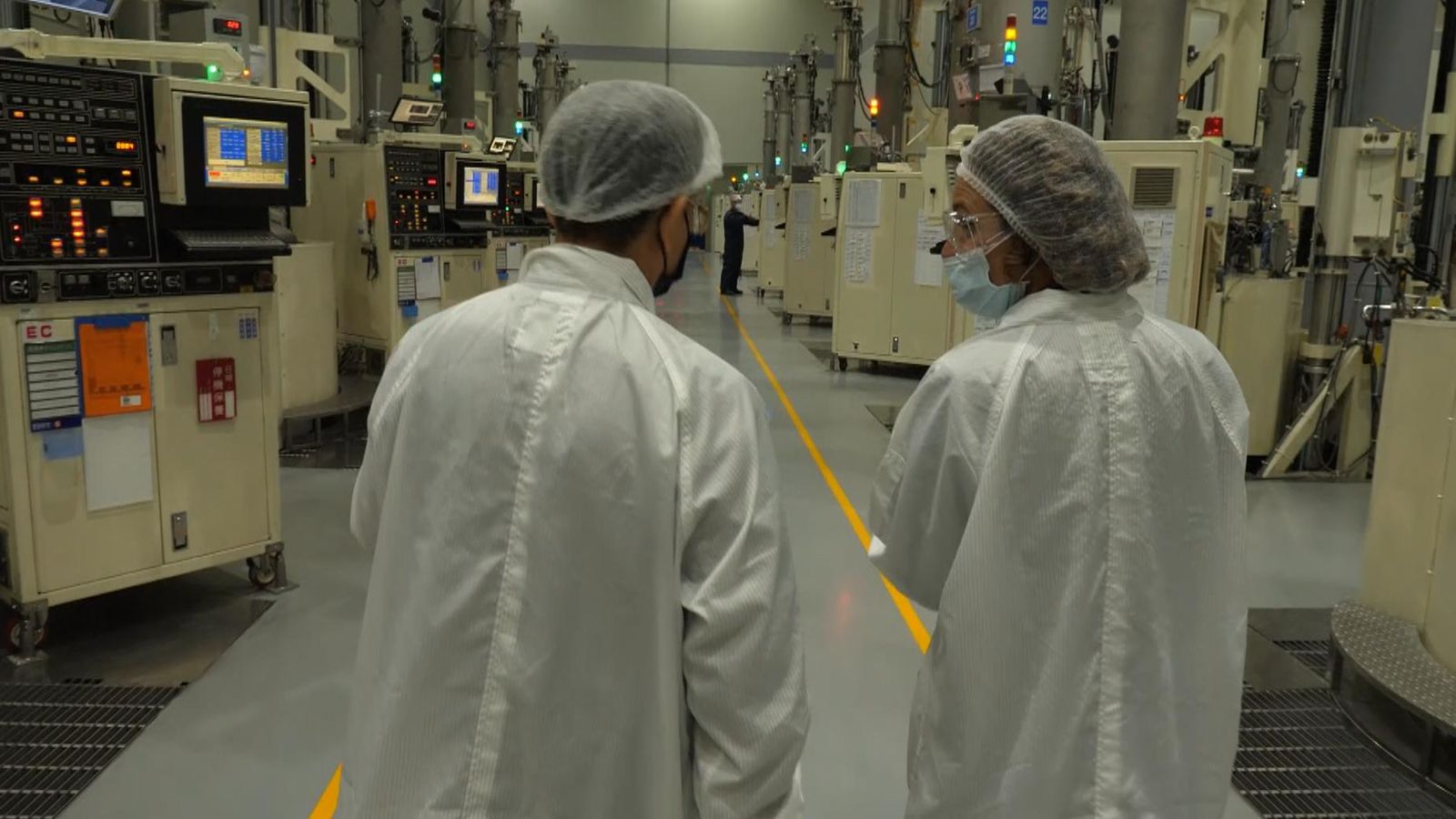China invasion of Taiwan would cause major blow to high-tech supply chain, warns boss of semiconductors firm

If China invaded Taiwan there would be major impacts across the global high-tech supply chain “in weeks”, according to the chief executive of one of the most important companies involved in making vital semiconductor chips.
Speaking exclusively to Sky News, Doris Hsu, CEO of Taiwan-based GlobalWafers, also said customers have “a lot of concerns” about China’s intentions in Taiwan and it’s one of the reasons the firm had opted to locate its new plant in Texas.
Increased tension across the Taiwan Strait has led to concerns that companies will look to protect themselves by withdrawing from the self-governing island that China sees as its own and direct longer-term investments elsewhere.
Taiwan is a vital global player in technological development and manufacturing, particularly semiconductors.
Semiconductors are the vital microchips described as the “brain” in modern electronics; they power everything from planes and appliances to cars and smartphones.
Taiwan manufactures around 90% of the world’s most advanced semiconductors and around 50% of the broader market, much of them made by global leader TSMC.
Any disruption to this would be catastrophic to global supply chains.
GlobalWafers manufactures silicon wafers, one of the crucial parts in semiconductors. It is the world’s third-largest supplier of this component and one of TSMC’s most important suppliers.
“Some of our customers do have quite a lot of concern about the overall security in Taiwan,” says Ms Hsu. “They want us to be more diversified.”
Advertisement
“In 20 years we have never been asked so frequently as we have recently, so many customers saying ‘Hey Doris, what if anything goes wrong? What’s your contingency plan?'”
Read more
Jet chatter reveals level of tension between China and Taiwan
Taiwan minister says when China most likely to invade
Taiwan to extend length of compulsory military service
Please use Chrome browser for a more accessible video player
3:31
How could a China-Taiwan war hurt the economy?
Speaking about the company’s new $5bn (£4bn) chip plant in Texas, she said one of the reasons for the decision was “contingency or risk management”.
While GlobalWafers is already a very globalised company, with 18 operations across nine countries, the threat of future instability is having an impact on decision making.
“I have been in this industry for over 20 years,” she says.
“In last 20 years, I have had to care more about the business, economic issues, the engineering stuff. What about IP [intellectual property]? What about your leadership or technology? But now I have to think about global political-related issues!”
‘Attack would affect $2trn of trade’
Semiconductors are just one of the areas where Taiwan punches hugely above its weight. Despite its small size, it is the world’s 16th-largest trading economy.
Research organisation the Rhodium Group has estimated that any form of attack or blockade to Taiwan would impact $2trn of economic activity, before taking into account any sanctions or secondary impacts.
There have been concerns that some firms, burnt perhaps by experiences in Russia, would look to move some operations away from the island.
Brompton Bikes, the British bicycle manufacturer, is just one firm that has indicated it will do this.
But experts say there is no mass exodus, more a gentle drip of long-term investment decisions going elsewhere.
“Most companies are not thinking actually about pulling out or relocation – but expansion,” explains Kirsty Tzun-Tzu Hsu, director of the Taiwan ASEAN Studies Center at Chung-Hua Institution of Economic Research.
“They are expanding their supply or supply chain from Taiwan to other countries or other regions, so that they may have someplace to back up if Taiwan cannot produce as quickly or as according to the expected timeframe.”
China is one of many nations also reliant on Taiwan’s high-tech sector and this has been cited by some experts as a reason an invasion may not happen.